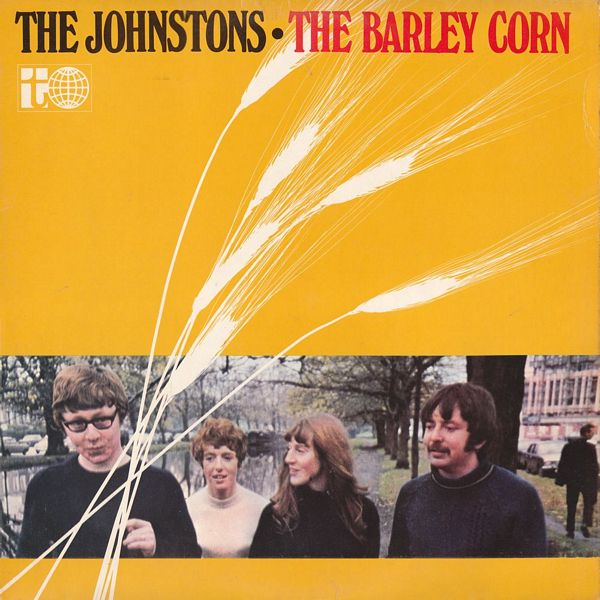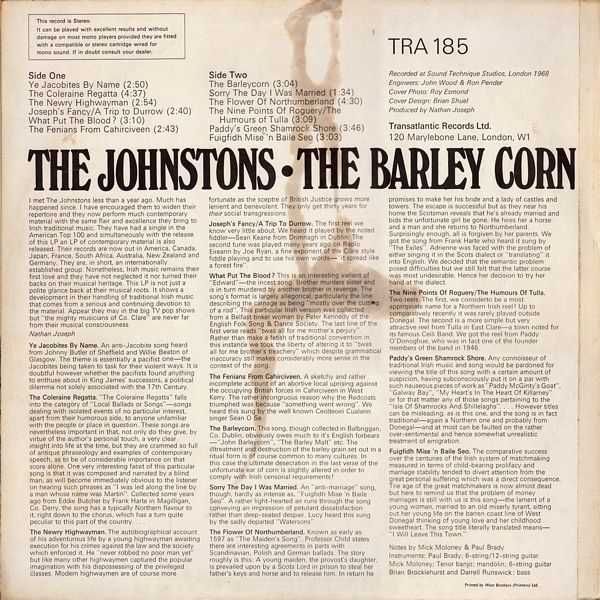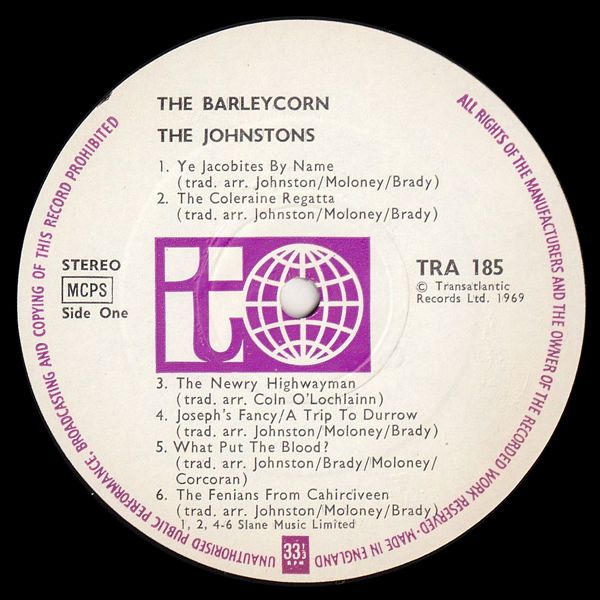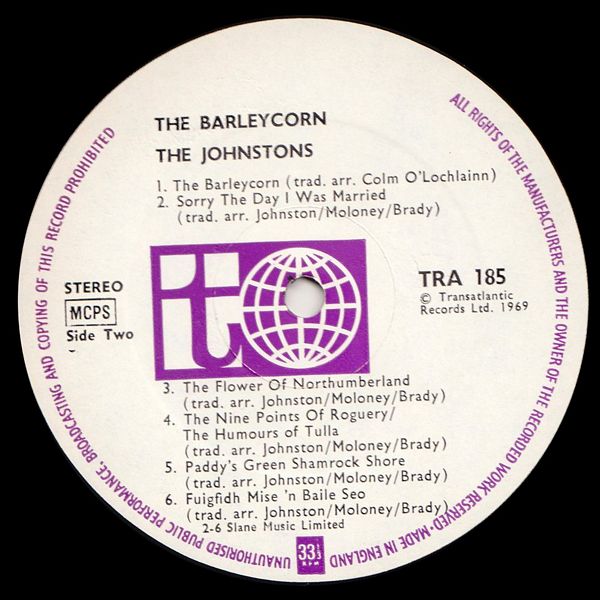

 |


 |
Sleeve Notes
I met The Johnstons less than a year ago. Much has happened since. I have encouraged them to widen their repertoire and they now perform much contemporary material with the same flair and excellence they bring to Irish traditional music. They have had a single in the American Top 100 and simultaneously with the release of this LP an LP of contemporary material is also released. Their records are now out in America, Canada, Japan, France, South Africa, Australia, New Zealand and Germany. They are, in short, an internationally established group. Nonetheless, Irish music remains their first love and they have not neglected it nor turned their backs on their musical heritage. This LP is not just a polite glance back at their musical roots. It shows a development in their handling of traditional Irish music that comes from a serious and continuing devotion to the material. Appear they may in the big TV pop shows but "the mighty musicians of Co. Clare" are never far from their musical consciousness.
Nathan Joseph
Ye Jacobites By Name
An anti-Jacobite song heard from Johnny Butler of Sheffield and Willie Beaton of Glasgow. The theme is essentially a pacifist one — the Jacobites being taken to task for their violent ways. It is doubtful however whether the pacifists found anything to enthuse about in King James' successors, a political dilemma not solely associated with the 17th Century.
The Coleraine Regatta
"The Coleraine Regatta" falls into the category of "Local Ballads or Songs" — songs dealing with isolated events of no particular interest, apart from their humorous side, to anyone unfamiliar with the people or place in question. These songs are nevertheless important in that, not only do they give, by virtue of the author's personal touch, a very clear insight into life at the time, but they are crammed so full of antique phraseology and examples of contemporary speech, as to be of considerable importance on that score alone. One very interesting facet of this particular song is that it was composed and narrated by a blind man, as will become immediately obvious to the listener on hearing such phrases as "I was led along the line by a man whose name was Martin''. Collected some years ago from Eddie Butcher by Frank Harte in Magilligan, Co. Derry, the song has a typically Northern flavour to it, right down to the chorus, which has a turn quite peculiar to this part of the country …
The Newry Highwayman
The autobiographical account of his adventurous life by a young highwayman awaiting execution for his crimes against the law and the society which enforced it. He "never robbed no poor man yet" but like many other highwaymen captured the popular imagination with his dispossessing of the privileged classes. Modern highwaymen are of course more fortunate as the sceptre of British Justice grows more lenient and benevolent. They only get thirty years for their social transgressions.
Joseph's Fancy/A Trip To Durrow
The first reel we know very little about. We heard it played by the noted fiddler — Seán Keane from Drimnagh in Dublin. The second tune was played many years ago on Radio Eireann by Joe Ryan, a fine exponent of the Clare style fiddle playing and to use his own words — "it spread like a forest fire".
What Put The Blood?
This an interesting variant of "Edward" — the incest song. Brother murders sister and is in turn murdered by another brother in revenge. The song's format is largely allegorical, particularly the line describing the carnage as being "mostly over the cutting of a rod". This particular Irish version was collected from a Belfast tinker woman by Peter Kennedy of the English Folk Song & Dance Society. The last line of the first verse reads "twas all for me mother's perjury". Rather than make a fetish of traditional convention in this instance we took the liberty of altering it to "twas all for me brother's treachery" which despite grammatical inaccuracy still makes considerably more sense in the context of the song.
The Fenians From Cahirciveen
A sketchy and rather incomplete account of an abortive local uprising against the occupying British forces in Cahirciveen in West Kerry. The rather incongruous reason why the Redcoats triumphed was because "something went wrong". We heard this sung by the well known Ceolteoiri Cualann singer Seán O Se.
The Barleycorn
This song, though collected in Balbriggan, Co. Dublin, obviously owes much to it's English forbears — "John Barleycorn", "The Barley Malt" etc. The ill treatment and destruction of the barley grain set out in a ritual form is of course common to many cultures. In this case the ultimate desecration in the last verse of the unfortunate ear of corn is slightly altered in order to comply with Irish censorial requirements!
Sorry The Day I Was Married
An "anti-marriage" song, though, hardly as intense as, "Fuigfidh Mise 'n Baile Seo". A rather light-hearted air runs through the song conveying an impression of petulant dissatisfaction rather than deep-seated despair. Lucy heard this sung by the sadly departed "Watersons".
The Flower Of Northumberland
Known as early as 1597 as "The Maiden's Song". Professor Child states there are interesting agreements in parts with Scandinavian, Polish and German ballads. The story roughly is this: A young maiden, the provost's daughter. is prevailed upon by a Scots Lord in prison to steal her father's keys and horse and to release him. In return he
promises to make her his bride and a lady of castles and towers. The escape is successful but as they near his home the Scotsman reveals that he's already married and bids the unfortunate girl be gone. He hires her a horse and a man and she returns to Northumberland. Surprisingly enough, all is forgiven by her parents. We got the song from Frank Harte who heard it sung by "The Exiles". Adrienne was faced with the problem of either singing it in the Scots dialect or "translating" it into English. We decided that the semantic problem posed difficulties but we still felt that the latter course was most undesirable. Hence her decision to try her hand at the dialect.
The Nine Points Of Roguery/The Humours Of Tulla
Two reels. The first, we consider to be a most appropriate name for a Northern Irish reel! Up to comparatively recently it was rarely played outside Donegal. The second is a more simple but very attractive reel from Tulla in East Clare — a town noted for its famous Ceili Band. We got the reel from Paddy O'Donoghue, who was in fact one of the founder members of the band in 1946.
Paddy's Green Shamrock Shore
Any connoisseur of traditional Irish music and song would be pardoned for viewing the title of this song with a certain amount of suspicion, having subconsciously put it on a par with such nauseous pieces of work as "Paddy McGinty's Goat", "Galway Bay", "My Heart's In The Heart Of Killarney" or for that matter any of those songs pertaining to the "Isle Of Shamrocks And Shillelaghs" … However titles can be misleading, as is this one, and the song is in fact traditional — again a Northern one and probably from Donegal — and at most can be faulted on the rather over-sentimental and hence somewhat unrealistic treatment of emigration.
Fuigfidh Mise 'n Baile Seo
The comparative success over the centuries of the Irish system of matchmaking measured in terms of child-bearing prolifacy and marriage stability tended to divert attention from the great personal suffering which was a direct consequence. The age of the great matchmakers is now almost dead but here to remind us that the problem of money marriages is still with us is this song — the lament of a young woman, married to an old miserly tyrant, sitting out her young life on the barren coast line of West Donegal thinking of young love and her childhood sweetheart. The song title literally translated means — "I Will Leave This Town."